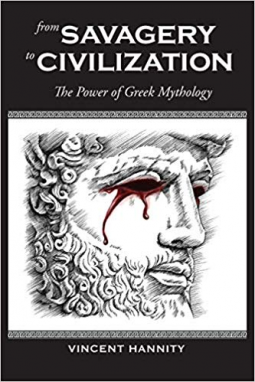
From Savagery to Civilization
The Power of Greek Mythology
by Vincent Hannity
This title was previously available on NetGalley and is now archived.
Send NetGalley books directly to your Kindle or Kindle app
1
To read on a Kindle or Kindle app, please add kindle@netgalley.com as an approved email address to receive files in your Amazon account. Click here for step-by-step instructions.
2
Also find your Kindle email address within your Amazon account, and enter it here.
Pub Date Dec 01 2018 | Archive Date Aug 14 2019
Talking about this book? Use #FromSavageryToCivilization #NetGalley. More hashtag tips!
Description
The Stories of Classical Mythology Have Endured for 2500 Years.
The ancient Greeks, bedeviled by nearly unbearable adversities, struggled for 2500 years to define their cultural identity. In the end they prevailed, emerging from savage tribalism to become the world's first democracy and one of the greatest civilizations ever known.To help scale those heights, the Greeks created an elaborate mythology. They filled it with anthropomorphic gods and mind bending tales of valor and heroism -- lessons in how to survive and thrive in a harsh environment. (Western Cultural Tradition, Bronze Age)
Myths of cosmology. . . .Gaia and Uranus, earth and sky, the primordial couple and the first generation of gods; Zeus, supreme leader of the Olympian gods with his invincible masculine will to power; Demeter, goddess of grain and agriculture, who continually sorrows; Persephone, queen of the underworld, who repeatedly dies and returns; Aphrodite, goddess of love and sexual desire, who starts and ends the Age of Heroes; and more....(Athena, Dionysus, Apollo, Artemis, Hera, Poseidon, Titans, Cronus)
Myths of human evolution. . . .Prometheus, who shoots fire through the imaginations of men; first woman Pandora, who releases all the world's evils, except hope; ancient Greece's greatest hero Heracles, who suffers, dies and becomes immortal; and more....(Theseus)
Brilliant but brutal Achilles, whose rage nearly brings defeat to the Greeks; Trojan King Priam, who puts to his lips the hand of the man who killed his son; wily Odysseus, who outwits giants, witches, goddesses and cannibals to return home and claim his wife and throne; (Hector, Paris, Helen, Agamemnon, Telemachus, Penelope, Patroclus)
Agamemnon, Clytemnestra, Orestes, Electra and Iphigenia -- the House of Atreus -- from whose atrocities a new form of social justice emerges; blind Oedipus, who suffers from innocently fulfilling a prophecy of patricide and incest; Antigone, who dies for following the gods' instructions in violation of the king's orders; and more....(Athena, Furies, Aegisthus, Oracle at Delphi)
The Romans: Romulus, who slays his twin Remus, then founds Rome; Aeneas, the Trojan prince who establishes Roman civilization; and more....(Dido, Venus, Juno, Turnus, Ovid)
These myths are filled with massive amounts of blood and gore, tragic scenes of war, and individual revenge killings. Murder and mayhem reign throughout. Graphic sexuality of all persuasions, by gods and men alike, permeate these stories. Something in these myths will offend nearly everybody, so brace yourself.
You will witness the profound ability of mankind to withstand extreme physical and emotional suffering and pain, and still retain their humanity. You will see awe-inspiring heroism as Greek warriors face overwhelming odds for no other reason than to bring everlasting honor to their own name. You will behold a woman of ship-launching beauty and goddesses of alluring sexuality. You may be moved by examples of genuine humanity - love, compassion, and mercy.
And finally, a renewed hope for mankind may surge in your breast, too, when you witness an old man, weeping and clutching the knees of an enemy warrior, while the enemy warrior himself also weeps.
Advance Praise
5.0 out of 5 stars A Must Read for its Nuance and Interpretation
January 5, 2019
Format: Paperback Verified Purchase
In his book "from Savagery to Civilization, The Power of Greek Mythology", Vincent Hannity guides us through the gates of our history via literature of the ancient Greeks. Their stories at the dawn of western civilization nearly 3,000 years ago, the gods, goddesses and humans, and their deathly struggles in violence, sex, revenge and, indeed, redemption are the messy stuff of our heritage that should not be ignored. In his concise and well-written 172 pages of instructive narration, Hannity introduces us — or refreshes us — to a cast of characters in mythology from Homer’s Achilles, the greatest warrior in the Greek army and the main protagonist in the "Iliad", to Zeus, who reigns supreme ruler over the gods. Not only does Hannity succinctly outline stories in the likes of the "Iliad" and "Odyssey", but he gives us the nuances. Of the "Iliad", he writes, “The opening and closing episodes focus on the tragic course of Achilles’ rage to his final recognition of human values. That’s the epic’s central theme, worked out against a background of relentless violence and death.” But "from Savagery to Civilization" takes its reader beyond Greek mythology to its relationship with the writings of the Romans (didn’t those Italians copy the Greeks in about everything in literature, architecture and government?), in particular to Virgil’s "Aeneid", which is not a myth but details Aeneas’ fate leading to the founding of Rome. Hannity’s book, wonderfully illustrated by Erin Ann Jensen, contains an additional 16 pages of bibliography and character glossary. It should be required reading for introductory high school and college classes on both Greek and Roman mythology. As one who studied Latin and Greek extensively in high school and college, but who somehow missed out on the meaning and appreciation of mythology, I would have benefited immensely from such a book. But I am fortunate to have it now after recently rereading the "Iliad". Hannity, a retired corporate executive and nearly lifelong student of classical languages, writes with scholarship and wit. My enjoyment and understanding of the "Iliad" would have been that much more fulfilling by virtue of Hannity’s nuance and interpretation had I read his book in advance. Indeed, this is a book for every reader who has a love of language and storytelling. In addition, it should be a must-read for every aspiring contestant for the television quiz show Jeopardy. That alone might vault it into the celestial, godly realm of bestseller stature.
Available Editions
| EDITION | Ebook |
| ISBN | 9780578430713 |
| PRICE | $5.99 (USD) |
Links
Average rating from 8 members
Featured Reviews
 Margaret B, Reviewer
Margaret B, Reviewer
The author's intent is to show how Greek mythology describes the changes in Greek culture and thought as the civilization developed. For someone familiar with the classics this will be too basic, but it would be very useful for those preparing to read Homer, Hesiod, the Greek playwrights and the Romans for the first time or as a text for a high school or a basic college course on Greek and Roman mythology and history. It would also be a good addition in libraries serving those populations.
 Educator 317339
Educator 317339
For a reader who is relatively new to mythology, this sirt-of-textbook will be helpful. High school readers will be a good audience.
Readers who liked this book also liked:
Jakub Politzer (Illustrator), Christina Dumalasova (adapter), Katerina Horakova (adapter)
Comics, Graphic Novels, Manga, General Fiction (Adult)







